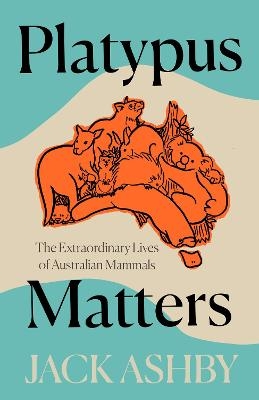
Platypus Matters
The Extraordinary Story of Australian Mammals
Seiten
2022
William Collins (Verlag)
978-0-00-843143-3 (ISBN)
William Collins (Verlag)
978-0-00-843143-3 (ISBN)
- Titel ist leider vergriffen;
keine Neuauflage - Artikel merken
Winner of the Whitley Award for Best Natural History Book 2022
A compelling, funny, first-hand account of Australia's wonderfully unique mammals and how our perceptions impact their future.
Think of a platypus: they lay eggs (that hatch into so-called platypups), they produce milk without nipples and venom without fangs and they can detect electricity. Or a wombat: their teeth never stop growing, they poo cubes and they defend themselves with reinforced rears. Platypuses, possums, wombats, echidnas, devils, kangaroos, quolls, dibblers, dunnarts, kowaris: Australia has some truly astonishing mammals with incredible, unfamiliar features. But how does the world regard these creatures? And what does that mean for their conservation?
In Platypus Matters, naturalist Jack Ashby shares his love for these often-misunderstood animals. Informed by his own experiences meeting living marsupials and egg-laying mammals on fieldwork in Tasmania and mainland Australia, as well as his work with thousands of zoological specimens collected for museums over the last 200-plus years, Ashby's tale not only explains the extraordinary lives of these animals, but the historical mysteries surrounding them and the myths that persist (especially about the platypus). He also reveals the toll these myths can take.
Ashby makes it clear that calling these animals ‘weird’ or ‘primitive’ – or incorrectly implying that Australia is an ‘evolutionary backwater’ – a perception that can be traced back to the country's colonial history – has undermined conservation: Australia now has the worst mammal extinction rate of anywhere on Earth. Important, timely and written with humour and wisdom by a scientist and self-described platypus nerd, this celebration of Australian wildlife will open eyes and change minds about how we contemplate and interact with the natural world – everywhere.
A compelling, funny, first-hand account of Australia's wonderfully unique mammals and how our perceptions impact their future.
Think of a platypus: they lay eggs (that hatch into so-called platypups), they produce milk without nipples and venom without fangs and they can detect electricity. Or a wombat: their teeth never stop growing, they poo cubes and they defend themselves with reinforced rears. Platypuses, possums, wombats, echidnas, devils, kangaroos, quolls, dibblers, dunnarts, kowaris: Australia has some truly astonishing mammals with incredible, unfamiliar features. But how does the world regard these creatures? And what does that mean for their conservation?
In Platypus Matters, naturalist Jack Ashby shares his love for these often-misunderstood animals. Informed by his own experiences meeting living marsupials and egg-laying mammals on fieldwork in Tasmania and mainland Australia, as well as his work with thousands of zoological specimens collected for museums over the last 200-plus years, Ashby's tale not only explains the extraordinary lives of these animals, but the historical mysteries surrounding them and the myths that persist (especially about the platypus). He also reveals the toll these myths can take.
Ashby makes it clear that calling these animals ‘weird’ or ‘primitive’ – or incorrectly implying that Australia is an ‘evolutionary backwater’ – a perception that can be traced back to the country's colonial history – has undermined conservation: Australia now has the worst mammal extinction rate of anywhere on Earth. Important, timely and written with humour and wisdom by a scientist and self-described platypus nerd, this celebration of Australian wildlife will open eyes and change minds about how we contemplate and interact with the natural world – everywhere.
Jack Ashby is the assistant director of the University Museum of Zoology, Cambridge, and an honorary research fellow in the Department of Science and Technology Studies at University College London. He is the author of Animal Kingdom: A Natural History in 100 Objects and lives in Hertfordshire.
| Erscheinungsdatum | 11.05.2022 |
|---|---|
| Verlagsort | London |
| Sprache | englisch |
| Maße | 159 x 240 mm |
| Gewicht | 670 g |
| Themenwelt | Geschichte ► Teilgebiete der Geschichte ► Wirtschaftsgeschichte |
| Naturwissenschaften ► Biologie ► Ökologie / Naturschutz | |
| Sozialwissenschaften ► Soziologie | |
| ISBN-10 | 0-00-843143-4 / 0008431434 |
| ISBN-13 | 978-0-00-843143-3 / 9780008431433 |
| Zustand | Neuware |
| Haben Sie eine Frage zum Produkt? |
Mehr entdecken
aus dem Bereich
aus dem Bereich


